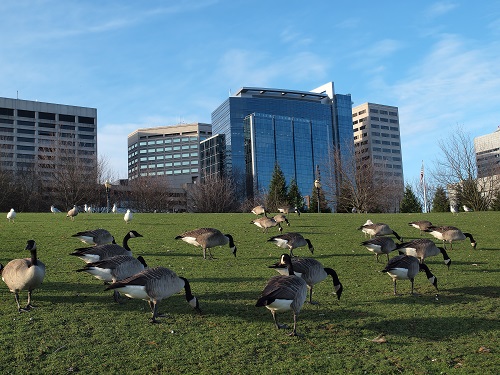
Golf courses. Baseball and softball diamonds. Fields for soccer, field hockey and lacrosse. No matter where your athletes play or what they play, it’s likely you have come across Canada geese. In fact, it’s equally likely those noisy black, white and grey critters have cast a long shadow (and plenty of other things) over games.
And make no mistake, it is becoming a problem. The Chillicothe (Ohio) Gazette reports that within recent years, the waterfowl population has risen exponentially, creating issues related to cleanliness, aggressive behavior, and injury to the waterfowl. When populations are not managed geese can spread disease, force out, injure and/or kill native wildlife.
Venue operators are trying a number of eradication methods, some gentle some, well, less so. In Chillicothe, the local parks and recreation department is implementing the use of border collies and noise-emitting devices as well as other methods to try to move the birds along.
The problem, say officials, is not just the fact that geese leave droppings across the grass, rendering it unsuitable for play, they also infiltrate local ponds and lakes and on occasions, swimming pools. And while goose infestation has long been a problem in many open areas, from parks to cemeteries, it took a dramatic upturn in quarantine since many sports facilities and parks were closed to the public, leading geese to establish territories for breeding and feeding. Since then, getting them out has been a struggle.
 Because the birds are migratory and opportunistic, running them off from an area is a temporary deterrent at best; they generally come back, which is why Galesburg, Illinois, and some surrounding communities would like to see geese harvested, and their meat donated to charity. But the city council has (ahem) shot down that idea.
Because the birds are migratory and opportunistic, running them off from an area is a temporary deterrent at best; they generally come back, which is why Galesburg, Illinois, and some surrounding communities would like to see geese harvested, and their meat donated to charity. But the city council has (ahem) shot down that idea.
Denver, meanwhile, has been using more different methods: using a remote-controlled machine called the Goosinator (go ahead and google it; we’ll wait) to create an environment that feels unsafe for the geese; additionally, park officials also have been oiling eggs, which halts egg development and decreases the number of goslings hatched in the parks.
So far, it seems to be working. Although the population has increased, that increase is markedly lower than in other years.
In other cities, the wish not to make the geese feel unwelcome (without hurting them) is also alive and well. California’s Foster City awarded a contract for goose management to Wildlife Innovations, Inc. The contract also contains habitat assessments and provides recommendations for habitat modifications to make Foster City parks less inviting for the geese, as well as community education plans.
Here’s one community education plan: Don’t feed the geese; venues need to be putting up this signage everywhere. The Conway Daily Sun reports that in areas where geese are fed by humans (bread, birdseed, table scraps, whatever), the birds do not leave; in fact, they stick around and breed. Areas known for handouts will see the goose population increase one-hundred-fold over time. They also become aggressive, approaching anyone they think might be carrying food. (Geese have a natural diet of aquatic plants, berries, seeds and invertebrates but will snap up just about anything people throw to them.)
Additionally, according to the Maine-based newspaper, The Berlin Sun, when the goose population concentrates in any one area, it not only ruins the grass but has a domino effect on the ecosystem: Overpopulation can lead to drastically increased levels of E. coli, a bacteria found in the geese droppings that in high numbers in water can cause gastrointestinal problems for people swimming in it. Another problem for swimmers is the potential for swimmer’s itch. Swimmer's itch, an allergic reaction to a parasite of birds and mammals, is commonly found in areas with high numbers of geese.
Geese can also disrupt games, something that happened last year when one landed on the field during a Padres/Dodgers match-up.
The Los Angeles Times noted: “After something like a wild-goose chase, the grounds crew wrapped the big bird in a towel, placed it in a plastic recycling bin and retreated back into the Dodgers dugout. The crowd cheekily booed, lamenting the end of a break to an otherwise dismal inning for the Dodgers, who trailed by two runs.”

